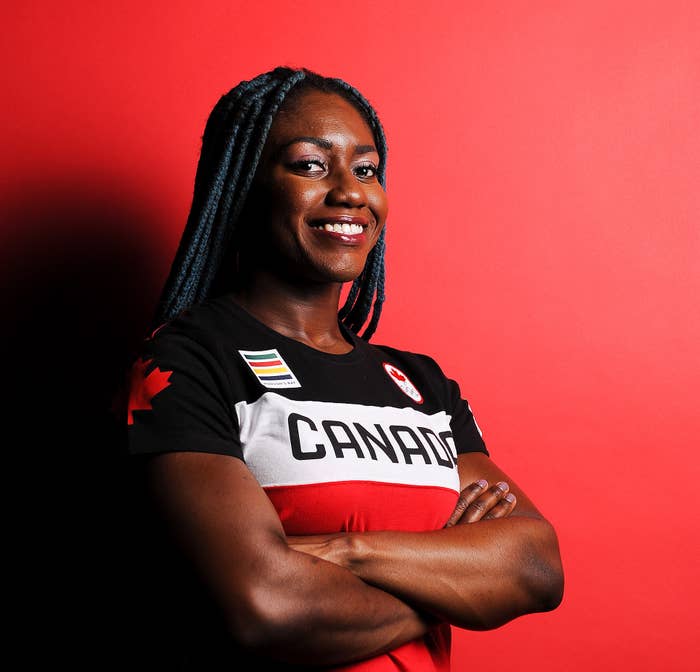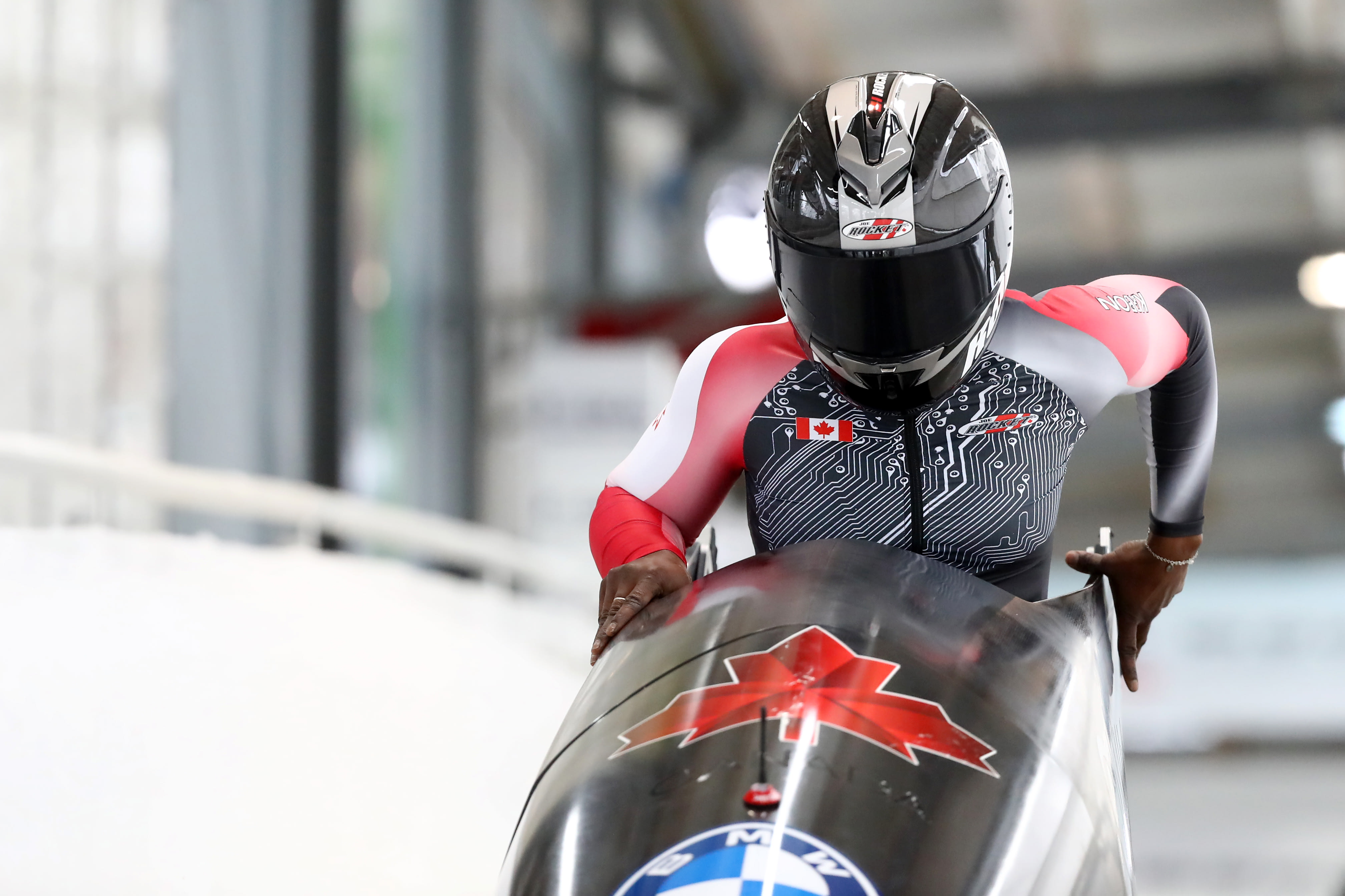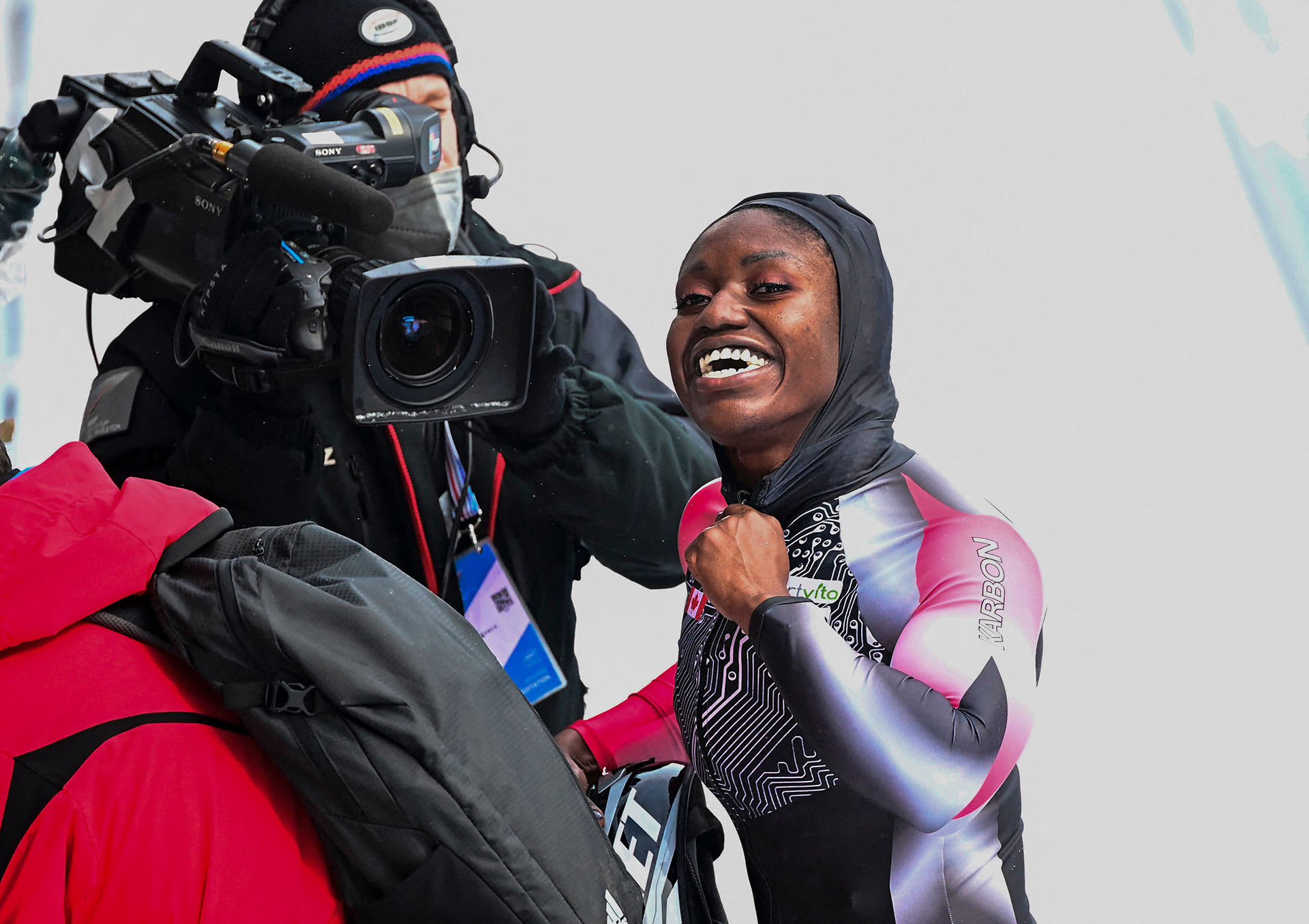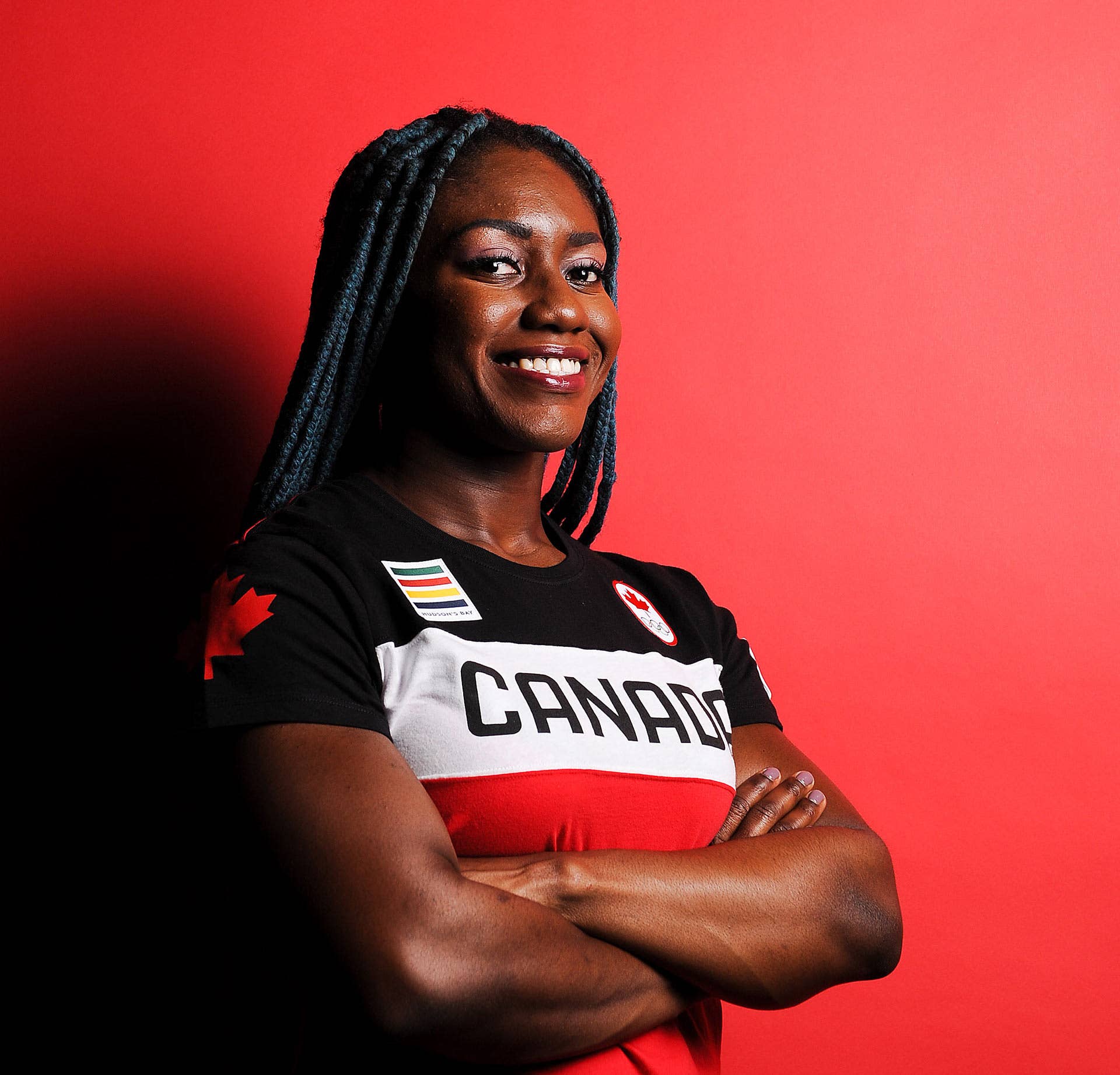
When the sport of monobob makes its Olympic debut on Feb. 10th, 2022 inside Yanqing National Sliding Centre in Beijing, China, Cynthia Appiah will take her mark. The 31-year-old Torontonian will lower her head, bend her knees, grip her sled, and on cue, she’ll sprint, pushing the 357-pound sled 50 meters on ice before elegantly slipping inside and steering towards what she hopes will be a podium finish for Canada.
Appiah will do this all alone, in a foreign country, in her first Olympic Games. That is the nature of monobob, a sport that condenses all the roles of traditional two- or four-person bobsleigh towards a single athlete, asking them to be the pusher, pilot, and the breakperson of a sled. There will be no one but herself to blame if she comes up short, and no one but herself to be responsible for if she crashes into a wall at a top speed of 120 kilometres per hour.
In other words, Appiah will control her own destiny in Beijing. And given her history in the sport of bobsleigh, she wouldn’t have it any other way.
Appiah is a Toronto woman through and through.
The daughter of Ghanaian immigrants, she grew up with her parents and three siblings in Toronto community housing at Islington and the 401, colloquially known as Izzy St. Andrews, where her parents still live. That’s where Appiah first discovered her love of sports, aided by the Jays Care Foundation’s Rookie League program, a charitable arm of the Toronto Blue Jays that brought kids from different under-privileged communities in Toronto to Riverdale Park every Thursday to play baseball.
“Growing up in community housing, you don’t really have a lot of resources. So, you just play with what you have,” Appiah tells Complex Canada from Königssee, Germany, a half hour south of the Austrian border near Salzburg, where the Canadian bobsleigh team was training before heading to Beijing. “I was very fortunate in that the ‘backyard’ of where I lived, we had a huge field… So, playing different games that way… my love for sport really came from just having whatever was accessible.”
Appiah attended Don Bosco high school in Rexdale before going to York University to study psychology, where she was a standout on the track and field team between 2008 and 2013, excelling in shot put and hammer throw and winning Female Athlete of the Year honours in 2012-13. But Appiah was growing discontented with the individual nature of track and field and, without a realistic chance of competing in a Summer Games, she needed something new to pursue after school.
“Who knows how much stronger Team Canada could be if we were able to get the best of the best that we have in this country, regardless of race?”
That’s when Appiah discovered bobsleigh. It was during the 2010 Winter Games in Vancouver, when she witnessed Canadian Shelley-Ann Brown, who is also Black, flying down the Whistler track with partner Helen Upperton en route to a silver medal in the two-woman event.
Appiah, who calls herself an “extroverted introvert” and who grew up playing team sports but who quickly came to realize that “hand-eye coordination and I are not friends,” was intrigued by the opportunity to pursue bobsleigh, a team sport with a tight-knit community due to its niche nature, which was something she was missing with track and field. She also immediately recognized that she could excel in bobsleigh due to her elite strength and endurance.

But more importantly, as a Black woman thinking of joining a predominantly white sport, Appiah saw herself in Brown, a Scarborough native of Jamaican descent who also attended university on a track and field scholarship and studied Psychology. And with winter sports being significantly less diverse than their summer counterparts, especially in sports like bobsleigh where the financial burden is so significant, Brown allowed Appiah to believe that she could not only pursue bobsleigh, but excel in it.
“I know that there are some people in certain circles that would hate me saying that representation matters, but it really does because what if Shelley-Ann [Brown] hadn’t competed in 2010? Who knows if this interview would even be going on,” Appiah says. “It’s one of those things where subconsciously you don’t realize how much something impacts you. And that’s what it was for me: watching Shelley-Ann standing on that podium, standing at the bottom of the track, and just cheering like a mad woman for having won her medal that she’s been working so hard to get.” It affected Appiah and made her realize something many non-racialized people take for granted.
“For certain sports, for some reason the barrier is just that much harder to break through, whether it be cost or access or whatever it is—racialized people just have a harder time getting into certain sports. And until someone does, we internalize it as that’s not for us,” Appiah says. “And I kind of want to help break down that stereotype that certain sports aren’t for us or certain activities aren’t for us, and really bring in that representation piece so that we have a stronger team, because who knows how much stronger Team Canada could be if we were able to get the best of the best that we have in this country, regardless of race?
“But, you know, that’s not where we’re at right now.”
Appiah is one of the most genuine and down to earth athletes that you will come across. She has little ego and strains to not make anything about herself, always giving credit to her teammates and supporters. But representation matters to Appiah, so much so that she feels compelled to be honest and straightforward about the lack of representation in Canadian athletics and in winter sports in general, even if it ruffles a few feathers. And that’s because Appiah has been personally affected by the uneven playing ground that comes with entering winter sports like bobsleigh, which tend to be expensive and inaccessible, even in rich countries that have the resources like Canada.
Appiah attended her first Bobsleigh Canada Skeleton (BCS) test camp in the summer of 2011, which happened to be taking place at York University. After graduating York in 2013, Appiah joined BCS as a breakwoman, performing in both the North America’s Cup and World Cup circuits. She was a natural, relying on her elite strength and athleticism from her track days to push her pilots to the podium, including two-time Olympic champion Kaillie Humphries to a gold and bronze medal and rookie pilot Alysia Rissling to her first ever World Cup bronze medal.
Over the course of four years, Appiah became the top break woman in the BCS program and was excited to participate in her first Olympic Games in 2018, but ahead of the PyeongChang Olympics, “circumstances beyond my control began to manifest and I ultimately found myself sitting on the sidelines as an alternate,” Appiah wrote at the time. Appiah traveled with the Canadian team to PyeongChang, South Korea in 2018, but served as an alternate and did not get to formally participate in the Games, instead helping her teammates from the sidelines.
Appiah said it felt like the world was crumbling down after the federation named her an alternate in PyeongChang, and almost quit bobsleigh entirely, even considering retiring from professional sport altogether. She felt that she did everything that was asked by the federation, and when the decision was made by higher ups, she reconsidered if it was worth going back for another four more years “to a team that I no longer trusted and to a system that I thought was fractured.”
But it would have been easy to give up, even if the circumstances weren’t fair and the news came as a surprise. Instead, Appiah committed another four years of hard work and financial insecurity to the sport of bobsleigh. Only this time, she was going to do it on her own terms, learning how to pilot rather than to continue as a breakperson, and competing in the sport of monobob as she looked to control her own destiny… literally.
Appiah went to a three-week driving school held by the International Bobsleigh Federation in Lake Placid, New York to learn how to drive a monobob, which is the safest sled to learn how to operate because only one person is ever in it at a time. Appiah came to appreciate the fair nature of the sport, as monobob puts athletes in regulation sleds that are standardized across the competition, not allowing for built-in advantages like in two-person or four-person sleds, which can be upgraded and customized. And Appiah, who calls herself “an uber competitive person, almost to a fault,” also likes monobob because it’s such a challenge, with one person wearing multiple hats and taking all the heat and all the glory at the same time.
But more than anything, the sport of monobob represents a platform for Appiah—one that has allowed her to make the rare leap from breakperson to pilot; a leap that is already difficult because the financial burden of becoming a pilot is so significant that it is usually more lucrative to stay in the role of breakperson. And, as a Black athlete, there is an additional barrier to making that leap, which is a lack of representation in the pilot seat, as “you rarely see anyone who looks like you in the pilot seat, so many have no aspirations of switching,” Appiah wrote in a first-person essay for the Canadian Olympic Committee.
In fact, Black pilots are so scarce that a total of zero competed at Vancouver 2010 and just four competed at Sochi 2014 and PyeongChang 2018. And the lack of representation is not random but rooted in a history of racism. Appiah wrote that the ignorance around Black pilots is similar to that around Black quarterbacks—that Black athletes “lack intelligence on the field.” Plus, Team USA pilot Elana Meyers Taylor wrote in 2020 of a sled manufacturer who “refuses to sell to Black pilots” and was quoted as saying, “If I wanted to see a monkey drive a sled, I’d go to the zoo.”
In spite of all the barriers, Appiah will compete as a pilot in both the monobob—where she currently ranks third in the world—and the two-woman event in Beijing. She will be one of a record six Black pilots competing at the Games.
“My passion and my motivation going into these Games is to really break down these stereotypes, and break down the mould of what a typical winter athlete can look like, and how successful we can be.”
Appiah is one of eight athletes featured in the Canadian Olympic Committee’s “Glory From Anywhere” Beijing campaign, which highlights the incredible sacrifices athletes make to overcome obstacles and be their best, finding value in the struggles as well as the successes.
As someone who doesn’t look like the typical bobsled pilot and who has had to overcome her fair share of obstacles since discovering the sport in 2013—not to mention the COVID-19 related obstacles and lockdowns of the past two years, which required her to train exclusively on a grass field for months—the campaign resonates with Appiah. She hopes to prove that racialized people can excel in winter sports such as bobsleigh in a similar way that Brown proved that to her almost 12 years ago, becoming someone that the next generation of Canadians can look up to, although this time it will be from the driver’s seat.
“The campaign literally means glory from anywhere, it doesn’t matter what part of Canada that you’re from, your socioeconomic status, your race,” Appiah says. “My passion and my motivation going into these Games is to really break down these stereotypes, and break down the mould of what a typical winter athlete can look like, and how successful we can be.
“I also want to demonstrate that Black athletes can compete in winter sports and hopefully connect with aspiring Black youth to help them pursue their dreams,” Appiah says. “We are lucky to have a rich Olympic history in Canada because we can look up to so many great Olympians who achieved their dreams through bravery or resilience. But it’s important that people can see themselves in their heroes. I hope my teammates and I can be the same source of inspiration for people watching the Games no matter their background, race or religion.”
While the 2022 Beijing Games have their fair share of political issues, they are the most gender-balanced Olympic Winter Games to date, with more female athletes (45 percent) and women’s events than at any previous Games, including monobob, which is exclusively for women.
And more to the point, because Appiah is genuinely unselfish and wants to see other women and racialized people succeed in winter sports—not just in Canada but beyond—she believes that monobob will be an exciting event for women all over the world to watch, “pushing the envelope of what women can do.” In fact, she believes that monobob can open the door for smaller, poorer nations to participate in winter sports.
“Bobsleigh is very expensive, and if you’re not from a traditional winter sport country like Canada, USA, or Germany, it’s really hard to get your foot in the door and to be competitive. And I think that’s where monobob is a decent alternative for smaller nations,” Appiah explains. “Traditionally tropical nations who want to get that winter sport experience can use monobob as that window of opportunity to get in and then hopefully grow their sport and then over the years will be able to get a two-woman team, a two-man team, a four-man team and build from there.”

Appiah says her goal for Beijing is to simply have fun. She doesn’t want to put a ‘gold or bust’ label on herself, partly because she knows that she races best when she avoids putting those kinds of expectations on herself. Still, despite being ranked No. 3 in the world, after what happened in 2018 and the years of hard work and financial instability she has put herself through to get to this point, Appiah would be happy to just finish the race in Beijing.
“That is an accomplishment in and of itself because that was an opportunity that was robbed of me from 2018. And I will be able to realize that dream by just going to Beijing,” Appiah says.
Nevertheless, Appiah is resilient and has never been one to settle. She has much bigger career goals, including to be a dominant force in the sport of bobsleigh by taking advantage of her biggest asset—her push—for as long as she remains motivated and passionate about the sport.
More than that, Appiah wants to give back to the Toronto community that raised her. She is an active ambassador with the Jays Care Foundation and wants to one day bring back a similar program to Izzy St. Andrews as the Rookie League initiative that introduced her to sports back in the day. She is also an ambassador at Fast and Female, a Canadian charity with a mission to keep girls aged 8 to 14 healthy and active in sports, and Classroom Champions, a non-profit organization that connects athletes with young students through a social and emotional learning curriculum and mentorship experience.
“I mean, I think it would be super selfish of me to leave the sport and not even contribute back to the community that has helped me get to where I am,” Appiah says about Izzy St. Andrews.
“There have been people that have been behind the scenes from day one that have helped me get to where I am right now. And it would be disingenuous of me to not even try and give back as a thank you and then to continue for the next generation because there are many other kids that can be in my position right now, and just to get that little boost from someone giving back to the community could help them realize their dream, whether it be in sports or not.”
Before returning home, however, Appiah will take her mark in Beijing, introducing the world to the sport of monobob and breaking the mould of what a typical winter athlete looks like. In doing so, she hopes to inspire the next generation of athletes to imagine themselves taking their mark beside her. If she can do that, everything else will be worth it.


